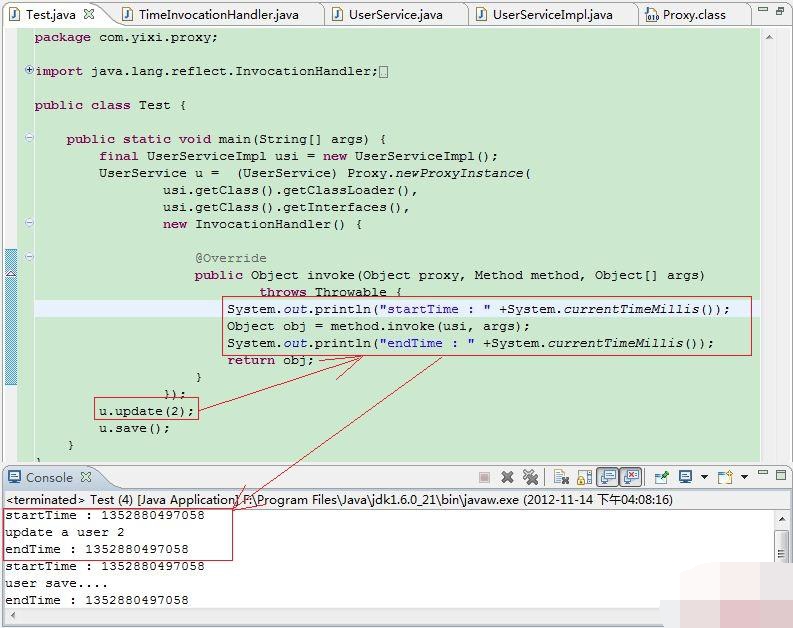
Today, by chance, I suddenly wanted to take a look at the dynamic proxy of JDK, because I knew a little about it before, and I just wanted to test its use. I wrote several interfaces and classes in a short time:
Interface class: UserService.java
package com.yixi.proxy;
public interface UserService {
public int save() ;
public void update(int id);
}Implementation class: UserServiceImpl.java
package com.yixi.proxy;
public class UserServiceImpl implements UserService {
@Override
public int save() {
System.out.println("user save....");
return 1;
}
@Override
public void update(int id) {
System.out.println("update a user " + id);
}
}Then I quickly wrote the InvocationHandler I wanted: the function of this is very simple. Record the start time and end time of method execution
TimeInvocationHandler.java
package com.yixi.proxy;
import java.lang.reflect.InvocationHandler;
import java.lang.reflect.Method;
public class TimeInvocationHandler implements InvocationHandler {
@Override
public Object invoke(Object proxy, Method method, Object[] args)
throws Throwable {
System.out.println("startTime : " +System.currentTimeMillis());
Object obj = method.invoke(proxy, args);
System.out.println("endTime : " +System.currentTimeMillis());
return obj;
}
}After all the preparations are done, of course we have to start writing tests!
Test.java
package com.yixi.proxy;
import java.lang.reflect.Proxy;
public class Test {
public static void main(String[] args) { 9 TimeInvocationHandler timeHandler = new TimeInvocationHandler();
UserService u = (UserService) Proxy.newProxyInstance(UserServiceImpl.class.getClassLoader(), UserServiceImpl.class.getInterfaces(), timeHandler);
u.update(2);
u.save();
}
}Run it happily, but it does not give you face. The result is a screen-full exception:
startTime : 1352877835040
startTime : 1352877835040
startTime : 1352877835040
Exception in thread "main" java.lang.reflect.UndeclaredThrowableException
at $Proxy0.update(Unknown Source)
at com.yixi.proxy.Test.main(Test.java:11)
Caused by: java.lang.reflect.InvocationTargetException
at sun.reflect.NativeMethodAccessorImpl.invoke0(Native Method)
at sun.reflect.NativeMethodAccessorImpl.invoke(NativeMethodAccessorImpl.java:39)
at sun.reflect.DelegatingMethodAccessorImpl.invoke(DelegatingMethodAccessorImpl.java:25)
at java.lang.reflect.Method.invoke(Method.java:597)
at com.yixi.proxy.TimeInvocationHandler.invoke(TimeInvocationHandler.java:12)
... 2 morecom.yixi.proxy.TimeInvocationHandler.invoke( TimeInvocationHandler.java:12) The exception clearly tells that the problem is in line 12 of TimeInvocationHandle: that is,
public Object invoke(Object proxy, Method method, Object[] args)
throws Throwable {
System.out.println("startTime : " +System.currentTimeMillis());
Object obj = method.invoke(proxy, args);
System.out.println("endTime : " +System.currentTimeMillis());
return obj;
}Modify TimeInvocationHandler.java
package com.yixi.proxy;
import java.lang.reflect.InvocationHandler;
import java.lang.reflect.Method;
public class TimeInvocationHandler implements InvocationHandler {
private Object o;
public TimeInvocationHandler(Object o){
this.o = o;
}
@Override
public Object invoke(Object proxy, Method method, Object[] args)
throws Throwable {
System.out.println("startTime : " +System.currentTimeMillis());
Object obj = method.invoke(o, args);
System.out.println("endTime : " +System.currentTimeMillis());
return obj;
}
}Modify Test.java
package com.yixi.proxy;
import java.lang.reflect.Proxy;
public class Test {
public static void main(String[] args) {
TimeInvocationHandler timeHandler = new TimeInvocationHandler(new UserServiceImpl());
UserService u = (UserService) Proxy.newProxyInstance(UserServiceImpl.class.getClassLoader(), UserServiceImpl.class.getInterfaces(), timeHandler);
u.update(2);
u.save();
}
}Now is the correct output result:
startTime : 1352879531334 update a user 2 endTime : 1352879531334 startTime : 1352879531334 user save.... endTime : 1352879531335
If you want to have less code, you can write an anonymous class directly:
package com.yixi.proxy;
import java.lang.reflect.InvocationHandler ;
import java.lang.reflect.Method;
import java.lang.reflect.Proxy;
public class Test {
public static void main(String[] args) {
final UserServiceImpl usi = new UserServiceImpl();
UserService u = (UserService) Proxy.newProxyInstance(
new InvocationHandler() {
System.out.println("startTime : " +System. currentTimeMillis());
Object obj = method.invoke(usi, args);
System.out.println("endTime : " +System.currentTimeMillis());
return obj;
}
});
u.update(2); The first parameter is the target object passed in, so why does the Invoke method of invocationHandler need an Object proxy parameter? Let’s look down!
For the most important invoke method (in my opinion) let’s see what the JDK says:
invoke
Object invoke(Object proxy,
Method method,
Object[] args)
throws Throwable在代理实例上处理方法调用并返回结果。在与方法关联的代理实例上调用方法时,将在调用处理程序上调用此方法。
参数:
proxy - 在其上调用方法的代理实例
method - 对应于在代理实例上调用的接口方法的 Method 实例。Method 对象的声明类将是在其中声明方法的接口,该接口可以是代理类赖以继承方法的代理接口的超接口。
args - 包含传入代理实例上方法调用的参数值的对象数组,如果接口方法不使用参数,则为 null。基本类型的参数被包装在适当基本包装器类(如 java.lang.Integer 或 java.lang.Boolean)的实例中。protected InvocationHandler h;
protected Proxy(InvocationHandler h) {
this.h = h;
}h.invoke(this,methodName,args);

在这里你就会发现貌似有点感觉了:当u.update(2)时 àProxy就会调用 handler.invoke(proxyClass,update,2) à 也就是调用了proxyClass.update(2);
当u.save();时àProxy就会调用handler.invoke(proxyClass,save,null) à也就是调用了proxyClass.save();
当Test.java改成这样时:
public class Test {
public static void main(String[] args) {
final UserServiceImpl usi = new UserServiceImpl();
UserService u = (UserService) Proxy.newProxyInstance(
usi.getClass().getClassLoader(),
usi.getClass().getInterfaces(),
new InvocationHandler() {
@Override
public Object invoke(Object proxy, Method method, Object[] args)
throws Throwable {
return null;
}
});
u.update(2);
u.save();
}
}注意这时候的匿名类的方法的返回的是null,运行一下就会发现:
Exception in thread "main" java.lang.NullPointerException
at $Proxy0.save(Unknown Source)
at com.yixi.proxy.Test.main(Test.java:17)17行有空指针 也就是这里的u.save()方法有为null的元素 难道是u是空的? 不应该啊如果u是null的话那么u.update(2)在那里就会报空指针异常了,当我把17行注释掉以后异常没了说明u.update()能正常执行。那这到底是为什么呢?
其实这就是invoke方法返回null的缘故:
注意一下UserService类中的两个方法:
public interface UserService {
public int save() ;
public void update(int id);
}InvocationHandler中invoke方法中第一个参数proxy貌似只是为了让Proxy类能给自己的InvocationHandler对象的引用调用方法时能传入代理对象proxyClass的引用,来完成proxyClass需要完成的业务。
更多Java dynamic proxy implementation method of proxy mode相关文章请关注PHP中文网!
 The difference between gateway and router
The difference between gateway and router
 How to recover files emptied from Recycle Bin
How to recover files emptied from Recycle Bin
 How to fix libcurl.dll missing from your computer
How to fix libcurl.dll missing from your computer
 Delete exif information
Delete exif information
 WiFi shows no access to the Internet
WiFi shows no access to the Internet
 My computer can't open it by double-clicking it.
My computer can't open it by double-clicking it.
 How to restore friends after being blocked on TikTok
How to restore friends after being blocked on TikTok
 Introduction to javascript special effects code
Introduction to javascript special effects code




